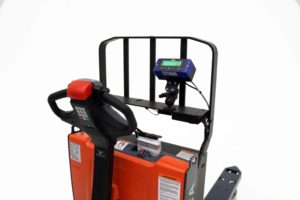Archive for November, 2022
What You Need To Know About CARB’s New Forklift Regulations
The California Air Resources Board (CARB) recently proposed its plan to phase out sales of all new gas-powered forklifts in the state by the end of 2026. This move is part of their larger effort to reduce air pollution and greenhouse gases in California. Let us answer some of the questions we are frequently asked about the upcoming regulations.
When does the proposed ban take effect?
CARB plans to ban sales of all new forklifts that are not zero-emission by 2026.
What does the mandate mean exactly?
Starting in 2026, businesses may not purchase or lease any new internal combustion (IC) engine forklifts. Companies will also be required to phase out and retire any IC forklifts that are 13 years or older or have an engine that is 13 years or older.
Are all forklifts affected by the planned regulation?
No. The regulation is for IC forklifts with a lift capacity of 12,000 pounds or less.
What forklifts are not affected by the proposed ban?
CARB’s Zero-Emission Mandate does not affect rough-terrain forklifts, pallet jacks, military tactical vehicles, forklifts with telescoping booms, and forklifts owned or operated by facilities that are subject to the Regulation for Mobile Cargo Handling Equipment at Ports and Intermodal Rail Yards.
Are there any exemptions or allowances for businesses to continue to use IC forklifts?
Yes. If businesses report their intention in advance, there is an allowance that allows for IC forklift rentals for unexpected occurrences or seasonal workload increases for up to 30 days each calendar year. There is also a low-use exemption to allow fleets to keep some IC forklift trucks if they are used for fewer than 200 hours per calendar year.
Is there a limit to how many low-use forklifts a business can have in service?
The number of low-use IC forklifts allowed is 10% of the total fleet.
Are there any exemptions for small businesses?
Yes! Businesses with fewer than 25 employees and less than $5 million in annual gross receipts can keep one low-use IC forklift indefinitely.
Are there any incentives for businesses to switch to electric?
Yes! CARB’s Low Carbon Fuel Standard offers cash incentives to zero-emission electric equipment owners. Click here to learn more.
What kind of paperwork is involved to stay compliant with CARB’s mandate?
Businesses must file an initial report with CARB that includes basic company and forklift information and a final report when the fleet has fully transitioned to zero-emission.
Can I get more answers?
You bet. If you have more questions, our material handling experts know everything about CARB’s Zero Emission Forklift Mandate. Click here to set up a free consultation.
What You Need To Know About California’s New Forklift Regulations
To reduce greenhouse gas emissions and make California’s air cleaner, the California Air Resources Board (CARB) recently announced plans to ban sales of all new forklifts in the state that are not zero-emission by 2026. This move is part of CARB’s larger effort to reduce air pollution and ensure that California’s businesses comply with the state’s increasingly stringent emissions standards. Let’s take a closer look at what this proposed ban entails and how it could impact businesses in the state.
The Need for Change
California is no stranger to air pollution. In recent years, smog levels have been increasing across the state, leading to health problems for people living in areas with high air pollution levels. Also, with more businesses moving into the area, there has been an increase in industrial activity that only worsens this problem. The CARB planned ban is intended to address these issues and help mitigate some of the effects of air pollution on Californians’ health.
The Benefits of Zero-Emission Forklifts 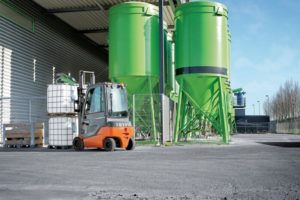
Not only does switching over from conventional diesel or gasoline-powered forklifts help reduce emissions and improve air quality, but it can also help businesses save money overall. Zero-emission forklifts are often less expensive than their conventional counterparts due to lower operating costs and fewer maintenance requirements. Furthermore, zero-emission models are powered by electricity instead of fuel, so businesses can avoid paying for expensive fuel costs on top of other expenses associated with owning a forklift fleet.
How The Ban Will Work
The proposed CARB ban will require all new forklifts leased or sold in California after 2026 to be zero-emission vehicles. It will also require businesses to start to phase out Internal Combustion (IC) forklifts, including propane and diesel forklifts, and replace them with zero-emission models.
The Impact on Businesses
The ban will majorly impact businesses that rely on IC-powered forklifts in their operations, as they will be required to transition to an alternative form of power. For some companies, this could mean switching out one or two IC forklifts with electric forklifts. For others, this could mean investing in an entirely new electric fleet. In either case, this presents a significant cost that businesses must consider when weighing their options.
In addition, logistical challenges may be associated with transitioning from IC-powered vehicles to electric ones due to differences in speed and efficiency between these models. Businesses may need more training for employees who operate these vehicles and modifications to existing infrastructure, such as charging stations for electric vehicles. All these factors should be considered when planning beyond 2026.
The Bottom Line
While it may present some challenges for affected companies, reducing air pollution is a crucial step towards creating a healthier environment for everyone in California – something we can all get behind! It is essential for all businesses operating in California to make plans now so that they are ready when the time comes for them to switch over entirely from gas-powered forklifts.
If you need help planning for the planned mandate, contact us to set up a free consultation with our material handling experts.
Reasons Why You Should Rent a Forklift
If you are in the market for a forklift, you may wonder if you should buy or rent one. Both sides have pros and cons, but in general, renting a forklift is a more flexible option. Here are four benefits of renting a forklift:
- You can get the correct type of equipment for your short-term project needs.
- You can upgrade, or downgrade as needed.
- You can avoid the hassle and expense of owning a forklift.
- You have access to material handling experts to help with set-up and training.
GET THE RIGHT EQUIPMENT FOR SHORT-TERM PROJECTS
If you only need a forklift for a short-term project, then renting is the way. Renting a forklift is also an excellent option for businesses that do not have the storage space for one.
Scissor lifts and boom lifts (sometimes called aerial work platforms) are popular short-term rentals. They offer many of the same benefits as a forklift but with a few key differences. 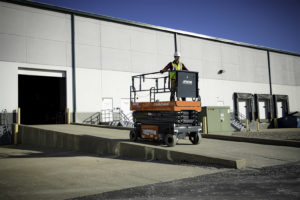
- They are smaller and more maneuverable, making them ideal for tight spaces.
- Unlike some material handling equipment, you can use most scissor lifts and boom lifts indoors and outdoors.
- They have a smaller weight capacity than a forklift.
FLEXIBILITY TO UPGRADE OR DOWNGRADE EQUIPMENT
Renting forklifts, pallet jacks, and other material handling equipment allows you to upgrade or downgrade your equipment whenever your business needs change. If you need a bigger forklift for a new project, you can rent one. If your business is downsizing and you don’t need as much equipment, you can return the equipment you don’t need and only pay for what you use.
AVOID THE HASSLE AND EXPENSE OF OWNING EXPENSIVE EQUIPMENT
Buying and maintaining forklifts and material-handling equipment is expensive. Not only do you have to pay for the equipment, but you also must pay for maintenance, repairs, and storage. Renting allows you to avoid the hassle and expense of buying and maintaining a forklift that you may not need in the long run.
GET HELP FROM MATERIAL HANDLING EXPERTS
You get help with setup and training if you rent forklifts, scissor lifts, boom lifts, and other equipment from experienced material handling dealerships. They can help you choose the right equipment for your needs and train you to use it safely. 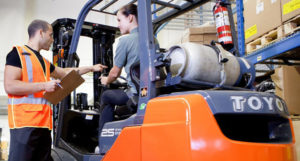
It’s important to remember that operators need to be trained to safely operate each type of equipment they use. For example, if your forklift driver is certified on 3-wheel electric forklifts and you rent an order picker, they will need additional training to comply with OSHA requirements.
Toyota Material Handling Solutions offers forklift operator safety training that includes classroom and hands-on instruction by Toyota-certified trainers. Click here to read our blog post with answers to common questions about forklift operator training.
If you need a forklift, aerial work platform, or other material-handling equipment for your business, consider renting instead of buying. You only pay for the equipment when you need it, and you don’t have to pay the expenses involved with owning expensive material-handling equipment. You’ll also have more flexibility and options and may even save money in the long run.
Toyota Material Handling Solutions has the industry’s most complete lineup of material handling solutions. Contact us to talk to a rental expert today!
